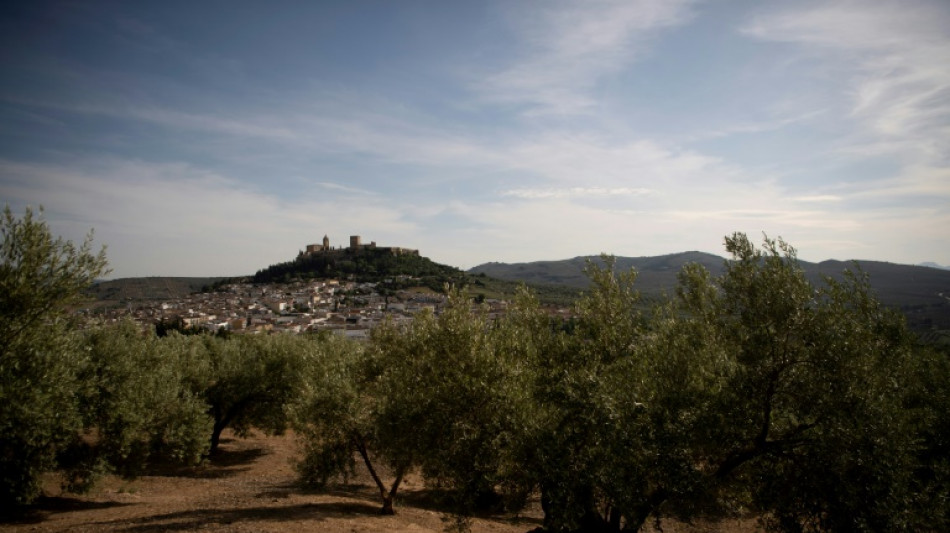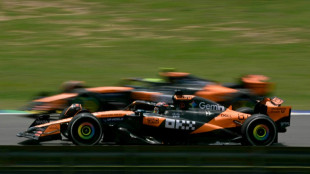
-
 Iran, US prepare for Oman talks after deadly protest crackdown
Iran, US prepare for Oman talks after deadly protest crackdown
-
Winter Olympics opening ceremony nears as virus disrupts ice hockey

-
 Mining giant Rio Tinto abandons Glencore merger bid
Mining giant Rio Tinto abandons Glencore merger bid
-
Davos forum opens probe into CEO Brende's Epstein links

-
 ECB warns of stronger euro impact, holds rates
ECB warns of stronger euro impact, holds rates
-
Famine spreading in Sudan's Darfur, warn UN-backed experts

-
 Lights back on in eastern Cuba after widespread blackout
Lights back on in eastern Cuba after widespread blackout
-
Russia, US agree to resume military contacts at Ukraine talks

-
 Greece aims to cut queues at ancient sites with new portal
Greece aims to cut queues at ancient sites with new portal
-
No time frame to get Palmer in 'perfect' shape - Rosenior

-
 Stocks fall as tech valuation fears stoke volatility
Stocks fall as tech valuation fears stoke volatility
-
US Olympic body backs LA28 leadership amid Wasserman scandal

-
 Gnabry extends Bayern Munich deal until 2028
Gnabry extends Bayern Munich deal until 2028
-
England captain Stokes suffers facial injury after being hit by ball

-
 Italy captain Lamaro amongst trio set for 50th caps against Scotland
Italy captain Lamaro amongst trio set for 50th caps against Scotland
-
Piastri plays down McLaren rivalry with champion Norris

-
 ECB holds interest rates as strong euro causes jitters
ECB holds interest rates as strong euro causes jitters
-
Spain, Portugal face floods and chaos after deadly new storm

-
 EU close to sealing trade deal with Australia
EU close to sealing trade deal with Australia
-
German Cup final to stay in Berlin until 2030

-
 What does Iran want from talks with the US?
What does Iran want from talks with the US?
-
Taming the lion: Olympians take on Bormio's terrifying Stelvio piste

-
 Wind turbine maker Vestas sees record revenue in 2025
Wind turbine maker Vestas sees record revenue in 2025
-
Italy's Casse tops second Olympic downhill training

-
 Anti-doping boss 'uncomfortable' with Valieva's coach at Olympics
Anti-doping boss 'uncomfortable' with Valieva's coach at Olympics
-
Bitcoin under $70,000 for first time since Trump's election

-
 'I am sorry,' embattled UK PM tells Epstein victims
'I am sorry,' embattled UK PM tells Epstein victims
-
England's Brook predicts record 300-plus scores at T20 World Cup

-
 Ukraine, Russia swap prisoners, US says 'work remains' to end war
Ukraine, Russia swap prisoners, US says 'work remains' to end war
-
Wales' Rees-Zammit at full-back for Six Nations return against England

-
 Sad horses and Draco Malfoy: China's unexpected Lunar New Year trends
Sad horses and Draco Malfoy: China's unexpected Lunar New Year trends
-
Hong Kong students dissolve pro-democracy group under 'severe' pressure

-
 Germany claws back 59 mn euros from Amazon over price controls
Germany claws back 59 mn euros from Amazon over price controls
-
Germany claws back 70 mn euros from Amazon over price controls

-
 VW and Stellantis urge help to keep carmaking in Europe
VW and Stellantis urge help to keep carmaking in Europe
-
Stock markets drop amid tech concerns before rate calls

-
 BBVA posts record profit after failed Sabadell takeover
BBVA posts record profit after failed Sabadell takeover
-
UN human rights agency in 'survival mode': chief

-
 Greenpeace slams fossil fuel sponsors for Winter Olympics
Greenpeace slams fossil fuel sponsors for Winter Olympics
-
Greenpeace slams fossel fuel sponsors for Winter Olympics

-
 Kinghorn, Van der Merwe dropped by Scotland for Six Nations opener
Kinghorn, Van der Merwe dropped by Scotland for Six Nations opener
-
Russia says thwarted smuggling of giant meteorite to UK

-
 Salt war heats up in ice-glazed Berlin
Salt war heats up in ice-glazed Berlin
-
Liverpool in 'good place' for years to come, says Slot

-
 Heathrow still Europe's busiest airport, but Istanbul gaining fast
Heathrow still Europe's busiest airport, but Istanbul gaining fast
-
Highest storm alert lifted in Spain, one woman missing

-
 Shell profits climb despite falling oil prices
Shell profits climb despite falling oil prices
-
Pakistan will seek govt nod in potential India T20 finals clash

-
 China shuns calls to enter nuclear talks after US-Russia treaty lapses
China shuns calls to enter nuclear talks after US-Russia treaty lapses
-
German factory orders rise at fastest rate in 2 years in December

| SCS | 0.12% | 16.14 | $ | |
| BP | -2.93% | 38.085 | $ | |
| NGG | -1.02% | 86.905 | $ | |
| CMSD | 0.17% | 23.91 | $ | |
| BTI | 0.08% | 61.68 | $ | |
| RIO | -4.49% | 92.33 | $ | |
| RBGPF | 0.12% | 82.5 | $ | |
| GSK | 3.34% | 59.21 | $ | |
| RYCEF | -0.36% | 16.62 | $ | |
| AZN | 1.06% | 189.46 | $ | |
| CMSC | -0.15% | 23.485 | $ | |
| BCE | -2.85% | 25.61 | $ | |
| BCC | -0.92% | 89.41 | $ | |
| JRI | 1.46% | 13.345 | $ | |
| VOD | -6.47% | 14.755 | $ | |
| RELX | 2.36% | 30.5 | $ |

Drought spells 'catastrophe' for Spain's olive harvest
An ongoing drought and soaring temperatures have unleashed fears of an olive "catastrophe" in Spain, the world's largest producer of olive oil, which suffered a very difficult year in 2022.
"It's barely rained since January. The ground is very dry," worries Cristobal Cano, secretary general of the small farmers' union (UPA) in the southern region of Andalusia, the heart of Spain's olive oil industry.
Cano, who owns 10 hectares of olive trees in Alcala la Real near Granada, has never seen such a worrying situation in the 20 years he's been a farmer.
"If something doesn't change radically in the next few weeks, it's going to be a catastrophe," he warned.
According to the AEMET weather agency, accumulated rainfall since October 1 has been 25 percent lower than normal across Spain and 50 percent lower in most of Andalusia, where reservoirs are at 25 percent capacity.
And the situation worsened at the end of April, when an early heatwave brought exceptionally high temperatures that saw the mercury hit 38.8 degrees Celsius (101.8 degrees Fahrenheit) in southern Spain.
"This happened as the olive trees were in bloom," says Rafael Pico, director of Asoliva, the Spanish association of olive oil producers and exporters, who fears the blooms will dry up.
"If there are no flowers, there's no fruit. And if there's no fruit, there's no oil."
- 'On the brink of collapse' -
For Spain -- which normally supplies 50 percent of the world's olive oil and exports close to 3.0 billion euros ($3.3 billion) worth every year -- the situation is even more worrying given the sector's disastrous output in 2021-2022.
During that season too, a lack of rain and extreme temperatures saw olive oil production plummeting 55 percent to 660,000 tonnes, compared to 1.48 million tonnes in 2021-2022, agriculture ministry figures show.
The scene is set to play out again this year.
"Looking at the forecasts, it's almost a given -- it's going to be another grim year," says Rafael Sanchez de Puerta, head of Dcoop, Spain's leading olive cooperative.
If the predictions prove true, it could spell the end for many olive farms.
"We can cope with one difficult year. It's a natural part of the growing cycle. But two years in a row will be a disaster. Many are on the brink of collapse," he says.
With the cost of machinery, paying salaries and repaying loans, "farmers need liquidity" to remain afloat, says Asoliva's Pico, recalling that many in Spain live from olive oil production.
- Runaway prices -
For consumers, the outlook is also bleak.
"The global price of olive oil depends largely on Spain," says Pico.
In recent months, the price of oil has jumped.
"In mid-April, olive oil was selling at 5,800 euros ($6,400) per tonne, up from 5,300 euros in January," says Fanny de Gasquet of Baillon Intercor, a brokerage firm specialising in oils and fats.
In January 2022, it was selling at 3,500 euros.
And the upward trend looks set to continue.
In Andalusia, young olive trees "don't have sufficiently developed roots to be able to extract water" from deep underground, meaning "there will be losses" that will have an impact on production over the next two or three years, she warns.
At the end of 2022, the Spanish government moved to lower VAT on olive oil from 10 percent to five percent as part of a package of measures to help consumers in the face of soaring inflation.
And to help farmers cope with the drought, the government has reduced the sector's income tax by 25 percent.
But for many, it's too little in the face of the looming crisis.
"Lowering taxes for people who will have almost no income is of little use to them," says Dcoop's Sanchez de Puerta, calling for more ambitious moves to combat "a drought that is lasting longer than it should".
E.Qaddoumi--SF-PST
